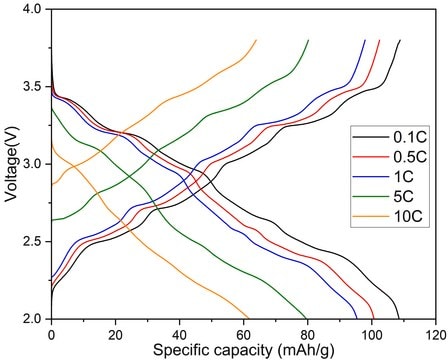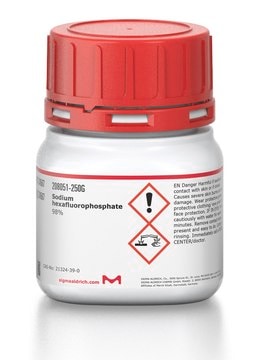932566
Sodium Terephthalate Composite
high-capacity anode for sodium ion batteries
Synonym(s):
Disodium terephthalate-carbon electrode, sodium-ion battery anode material
Sign Into View Organizational & Contract Pricing
All Photos(4)
About This Item
Recommended Products
Quality Level
Application
This product is a composite of disodium terephthalate and high surface area carbon nanosheets. With its low Na insertion voltage (0.2-0.6 V vs. Na+/Na), this material is a benchmark for counter electrode when developing new fast charging sodium-ion battery technologies, without risk of forming sodium dendrites. The composite is specially formulated to yield excellent contact of the active disodium terephthalate with the carbon black. This contact affords the high electronic conductivity and surface area that allows high capacity with a long cycle life. This electrode material was fabricated following sustainable procedures that minimize environmental impact. Further, it′s free of the toxic transition metals such as cobalt or nickel, thus a green alternative to conventional battery materials.
Storage Class Code
11 - Combustible Solids
WGK
WGK 2
Certificates of Analysis (COA)
Search for Certificates of Analysis (COA) by entering the products Lot/Batch Number. Lot and Batch Numbers can be found on a product’s label following the words ‘Lot’ or ‘Batch’.
Already Own This Product?
Find documentation for the products that you have recently purchased in the Document Library.
Disodium Terephthalate (Na2C8H4O4) as High Performance Anode Material for Low-Cost Room-Temperature Sodium-Ion Battery
Zhao, L., et al.
Advanced Energy Materials, 2, 962-965 (2012)
Sodium insertion in carboxylate based materials and their application in 3.6 V full sodium cells
Abouimrane, A., et al.
Energy & Environmental Science, 5, 9632-9632 (2012)
Tengfei Cao et al.
Chemistry (Weinheim an der Bergstrasse, Germany), 23(65), 16586-16592 (2017-09-19)
As a promising candidate for large-scale energy storage systems, sodium-ion batteries (SIBs) are experiencing a rapid development. Organic conjugated carboxylic acid anodes not only have tailorable electrochemical properties but also are easily accessible. However, the low stability and electrical conductivity
Towards sustainable and versatile energy storage devices: an overview of organic electrode materials
Song, Z., et al.
Energy & Environmental Science, 6, 2280-2280 (2013)
Nanoeffects promote the electrochemical properties of organic Na2C8H4O4 as anode material for sodium-ion batteries
Wan, F., et al.
Nano Energy, 13, 450-457 (2015)
Our team of scientists has experience in all areas of research including Life Science, Material Science, Chemical Synthesis, Chromatography, Analytical and many others.
Contact Technical Service








